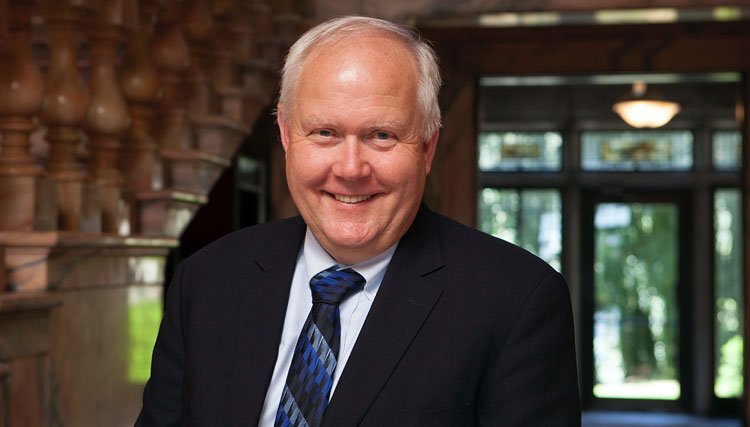

By Michael E. Geisler, Ph.D.
Sentinel Columnist
When I joined Manhattanville College as its President two years ago, I was especially interested in working with the vast number of industry leaders and businesses in Westchester and Fairfield County, over 350 of which are employee partners with the college.
Conversations with these leaders as well as my previous twenty-three years as a faculty member, administrator, and liaison to a major collaborative business venture at Middlebury College have given me a deep appreciation of the critical role played by liberal arts colleges in building the essential skills necessary to compete in a global economy and with a global workforce.
It is an outdated perception that students must learn the bulk of the actual content they need to be successful in a particular profession during their undergraduate years. Rather, what students need as part of their B.A. is excellent research and communication skills, critical thinking, facility with presenting the results of their research in public and, most importantly, an aptitude for collaborating with people from different disciplinary backgrounds.
In his book Robot-Proof, Joseph E. Aoun, the President of Northeastern University, has identified five critical human skills that will enable the coming two generations of students to compete with artificial intelligence (AI) by creating and mastering jobs that humans can perform much better than computers: whereas powerful neural networks enable computers to look for successful patterns in big data and thus will soon be able to outperform humans in any jobs that have even slightly predictable routines, they are notoriously weak at connecting the dots where such connections are not obvious.
Machines are also not good at connecting unrelated data points with each other. That is what humans do best: using bits of information from one field of experience and making unexpected cross-connections to other fields of experience, often jumping across three or four adjacent fields in the process. In other words, humans at their best can rapidly shift among different contexts to create entirely new contexts or fields of relevance. When necessary, humans will even move the goalposts. So the awareness of context is critical.
Contextual thinking is directly related to systems thinking, a concept which has been around for quite some time, but which has not been sufficiently utilized by our curricula. For example, given large enough sets of data, computers can model the potential impact of a small local airport into a large regional hub on a number of individual collateral systems, such as traffic patterns, the environment, the health and well-being of people living in the surrounding communities, the regional economy (job creation, real estate values), etc. However, computers would have a very hard time predicting how these individual systems interact with each other, which can be radically different depending on the make-up of the local population, the housing market, other transportation patterns, school systems, the reaction of different political constituencies etc. Would real estate prices go up as the result of the influx of new businesses or take a hit because of the environmental damage (including noise pollution)?
It takes the human ability to make nonobvious cross-connections across a large variety of different contextual impact fields and then to prioritize these connections in a way that actually delivers a compelling strategy for going forward (or not) with the new development. This type of systems thinking is nearly impossible for machine learning to accomplish at this point.
AI is also notoriously incompetent when it comes to culture. Cultural fluency, the ability to work collaboratively with people who come from very different backgrounds, (ethnic, race gender, geography, religion, political and personal value systems) sensitivities, concerns and anxieties, to a common task and who will therefore come up with very different solutions, is a uniquely human trait and likely to be robot-proof for a long time to come.
Finally, the innate human knack for experiential learning and entrepreneurial thinking will continue to give us an edge in competing against machine learning for decades to come. Like systems thinking, experiential learning derives its power from mapping new problems to past learning in unexpected ways. Where the two collide, entrepreneurial thinking is able to come up with creative new designs or innovative solutions.
While, theoretically, any educational environment or experience can develop the specific edge that humans enjoy over artificial intelligence, liberal arts colleges, with their emphasis on interdisciplinary study, small groups of teachers and learners, project-based learning, and the programmatic connection of curricular and co-curricular learning (including internships), are ideally positioned to develop what Aoun calls “Humanics,” the agile, boundary-crossing, systems thinking mental elasticity that will best equip students for the rapidly changing contexts and work environments of the mid-21st century.
What makes a liberal arts education so special? In a word: connectivity. “Only connect,” that famous admonition at the end of E.M. Forster’s Howard’s End might as well be the official motto of liberal arts colleges all over the world. It is the principle by which we live.
Every student at a liberal arts college will get a solid grounding in his or her chosen major, whether it is Biology or History, Business or Computer Science. Beyond that, however, students learn, both inside the classroom and in their everyday interactions in their residence halls and in the cafeteria, in a lab or on stage, how problems and solutions developed in one particular area depend upon and relate to problems and solutions developed in a different field.
Faculty at liberal arts institutions have decided to teach there instead of a Research 1 university because they value that same feature: they are notorious for being interested in interdisciplinary teaching and research, whether it is an All-College First-Year Seminar that exposes students to readings on a particular topic from the vantage point of different disciplines, or Global Studies, Communications or Biochemistry.
What students take away from liberal arts colleges more than from other educational environments is the ability to connect. More than any discipline-specific knowledge, this ability, to connect the dots (including dots that may be very far afield from one another) will be the critical edge needed to compete successfully in the new machine age. Liberal arts colleges are the crucibles where this leap will occur.
In my next column, I will talk more about how liberal arts colleges can deliver this type of education more effectively and what the curriculum of the future might look like.
Michael E. Geisler, Ph.D., is president of Manhattanville College, a private liberal arts college in Purchase, NY. He can be reached at Michael.Geisler@mville.edu or 914-323-5230.





